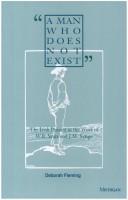| Listing 1 - 2 of 2 |
Sort by
|

ISBN: 0472105817 Year: 1995 Publisher: Ann Arbor The University of Michigan Press
Abstract | Keywords | Export | Availability | Bookmark
 Loading...
Loading...Choose an application
- Reference Manager
- EndNote
- RefWorks (Direct export to RefWorks)
Synge, John Millington --- Yeats, Jack Butler --- Boerenstand in de literatuur --- Ierland in de literatuur --- Ireland in literature --- Irlande dans la littérature --- Paysannerie dans la littérature --- Peasantry in literature --- English literature --- Authors [Irish ] --- History and criticism --- 19th century --- 20th century --- Yeats, William Butler --- Political and social views --- Literature and society --- Ireland --- History
Book
ISBN: 1611175488 9781611175486 9781611175479 161117547X Year: 2015 Publisher: Columbia : University of South Carolina Press,
Abstract | Keywords | Export | Availability | Bookmark
 Loading...
Loading...Choose an application
- Reference Manager
- EndNote
- RefWorks (Direct export to RefWorks)
"In this critical study of the influence of W. B. Yeats (1865-1939) on the poetry and drama of Robinson Jeffers (1887-1962), Deborah Fleming examines similarities in imagery, landscape, belief in eternal recurrence, use of myth, distrust of rationalism, and dedication to tradition. Although Yeats's and Jeffers's styles differed widely, Towers of Myth and Stone examines how the two men shared a vision of modernity, rejected contemporary values in favor of traditions (some of their own making), and created poetry that sought to change those values. Jeffers's well-known opposition to modernist poetry forced him for decades to the margins of critical appraisal, where he was seen as an eccentric without aesthetic content. Yet both Yeats and Jeffers formulated social and poetic philosophies that continue to find relevance in critical and cultural theory. Engaging Yeats's work enabled Jeffers to develop a related, though distinct, sense of what themes and subject matter were best suited for poetic endeavor. His connection to Yeats helps to explain the nature of Jeffers's poetry even as it helps to clarify Yeats's influence on those who followed him. Moreover, Fleming argues, Jeffers's interest in Yeats suggests that critics misunderstand Jeffers if they take his rejection of modernism (as exemplified by Wallace Stevens, William Carlos Williams, and Ezra Pound) as a rejection of contemporary poetry or the process by which modern poetry came into being"--
LITERARY CRITICISM / American / General. --- Modernism (Literature) --- Crepuscolarismo --- Literary movements --- Yeats, W. B. --- Jeffers, Robinson, --- Influence. --- Criticism and interpretation. --- Jeffers, John Robinson, --- Yeats, William Butler --- D. E. D. I., --- Daemon Est Deus Inversus, --- Ganconagh, --- I., D. E. D., --- Йейтс, У. Б. --- Ĭeĭts, U. B. --- Йейтс, Уильям Батлер, --- Ĭeĭts, Uilʹi︠a︡m Batler, --- Weilian Batele Yezhi, --- Yeṭs, Ṿilyam Baṭler, --- יטס, יטלאם בטלר --- ייטס, ויליאם בטלר, --- 威廉,巴特勒,叶芝,
| Listing 1 - 2 of 2 |
Sort by
|

 Search
Search Feedback
Feedback About
About Help
Help News
News